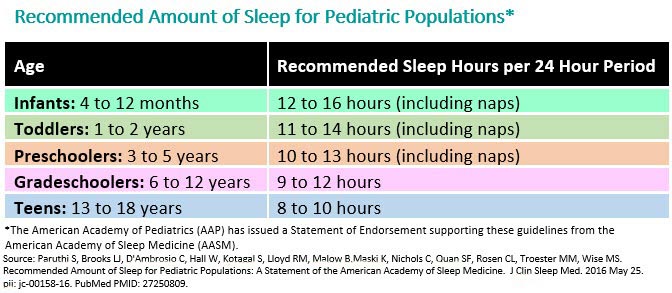Sleep needs vary from one person to another, but the American Academy of Pediatrics (AAP) endorses the guidelines put out by the American Academy of Sleep Medicine (AASM) regarding how much sleep children need at the different stages in their development. These recommendations are for a 24-hour period so if your child naps, be sure to take that into account when adding up their typical sleep hours.

Children thrive on a regular sleep routine. Side effects of regular sleep deprivation can include irritability, difficulty concentrating, high blood pressure, obesity, headaches and depression. Children who get enough sleep have a healthier immune system, better school performance, behavior, memory and mental health.
Help your child develop good sleep habits with these tips from the AAP:
Keep to a regular daily routine – the same waking time, meal times, nap time and play times will help your child feel secure. Start early with bedtime routines. An easy one for younger children is brush, book, bed. Read more here.
Be active during the day – keep kids physically active and make sure they have interesting and varied activities throughout the day.
Monitor screen time – the AAP recommends keeping all screens out of children’s bedrooms. Turn off all screens at least 1 hour before bedtime.
Don’t put your baby to bed with a bottle of juice, milk or formula – water is okay but anything else can cause tooth decay.
Avoid over scheduling – children and teens have lots of scheduled evening activities like sports, appointments, music lessons, etc. in addition to homework that can make getting a good night’s sleep hard. Be sure to take time to wind down and have downtime for your children.
Learn to recognize sleep problems – the most common sleep problems include difficult falling asleep, nighttime awakenings, snoring, stalling/resisting going to bed, sleep apnea and loud/heavy breathing while sleeping.
Read more information on healthy sleep habits on the AAP’s Healthy Children website here.
This blog is not a substitute for medical advice. Be sure to talk to your child’s medical provider with any questions.
